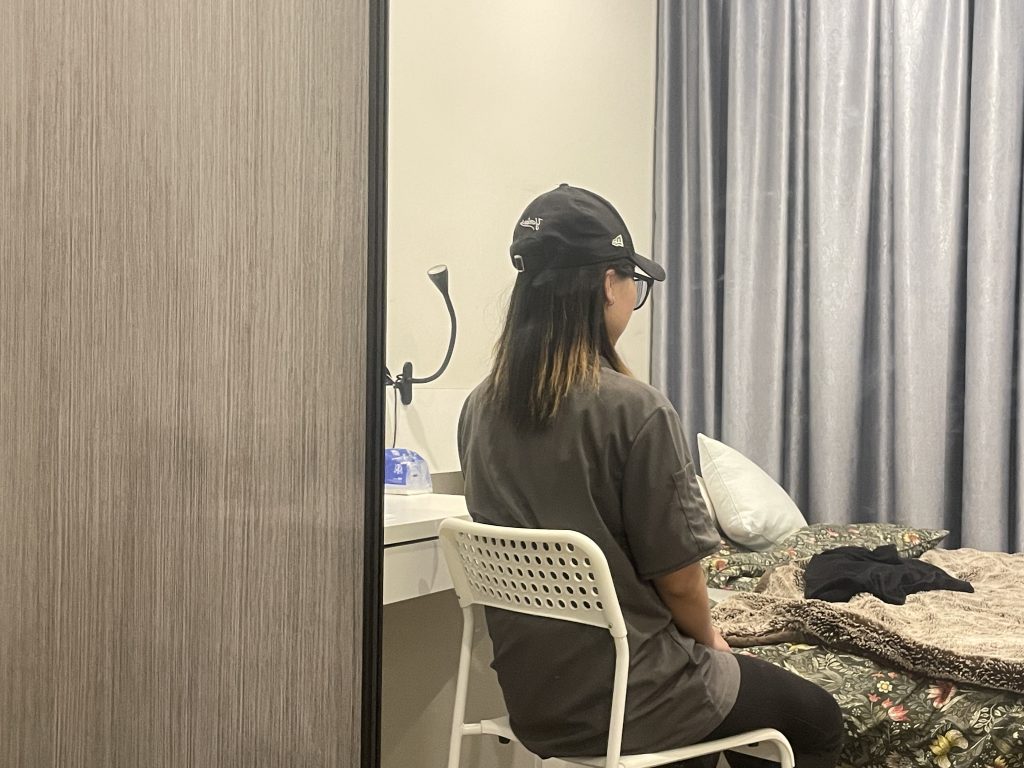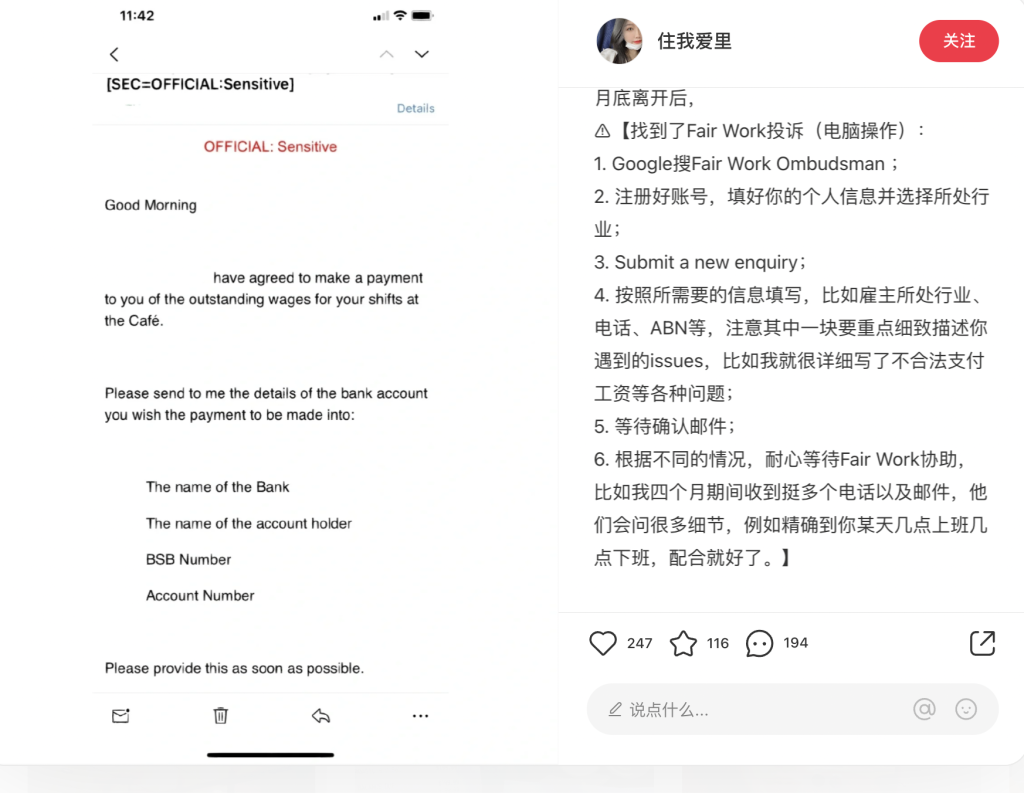

Saturday night, ten minutes past ten, Zoe, tired after nine hours of work, soaked the instant noodle in the shared kitchen of her shared apartment and carefully brought it back to her small room of eleven square meters.
“It’s too late to cook. I don’t want to disturb my roommates,” she said with a bitter smile, “takeaways are so expensive now. Buying a meal will cost as much as a third of my pay today.”
The postgraduate student at the University of Technology Sydney, * Zoe, works in a Chinese restaurant in the Chinese Quarter, earning $18 per hour.
From 1 July 2022, the Australian national minimum wage increased to $21.38 per hour.
Even though the Australian government has been cracking down on wage theft, Chinese international students still face wage theft in Australia.
“I know this wage is not legal, but I don’t want to seek the fair work’s help. I don’t want to lose my job. I need the regular weekly income, even if the salary is unfair,” she leaned back in her chair and said, “the shops around here all pay about the same. If I don’t do this job, someone will immediately replace me and get the same wage.”
It already became an unspoken default rule among the Chinese student community that wages in Chinese stores are lower.

“I’m now earning up to the 2018 minimum wage.”
Zoe’s first job was in a Chinese clothing store, earning just $12 per hour at a time when the legal minimum wage was around $18.
Zoe worked at an Asian supermarket last year, paid $24 per hour. She said, “I’ve had five part-time jobs in total. This was the first and only job where the employer paid me over minimum wage.”
In fact, Zoe’s job at the supermarket also didn’t meet the minimum wage.
Associate Professor at The University of Sydney Business School, Stephen Clibborn, pointed out that the minimum wage for part-time employees differs from casual employees.
Most jobs for international students, which have “no firm advance commitment” and “roster changes every week to suit their employer’s needs”, are casual-time jobs.
The minimum wage for a casual-time job is $26.725 per hour instead of $21.38 per hour.
Many Chinese shop owners blur out this concept and thus avoid paying the minimum casual time job.
“It is important to know that the national Minimum Wage is not the only minimum requirement for pay,” Professor Stephen Clibborn said, “an ‘Award’ sets pay that can be much higher than the National Minimum Wage for work on weekends and nights when many students work.”
Wage theft, also includes employers depriving employees of other rights, such as not complying with applicable modern rewards or not paying NES correctly.
Zoe said, “I never knew there was such a thing as overtime pay. I worked weekends or evenings every time.”
“I’d rather earn less than waste time on the road.”
After six months of commuting nearly an hour each way, Zoe chose to quit her job at the supermarket and opt for a job that paid less but was closer to home. She said, “the working hours went from six to nine hours a day. The total amount of money earned each week is similar.”
Zoe said she would also like to work in a local shop, “there are some great welfare systems for the staff in local shops, and there are not many local shops in the Chinese district I lived.”
She said, “there is also the fact that many international students nowadays would love to work in a big supermarket like Woolworths or Coles, but actually because there is only one or two of these kinds of supermarkets in a district, the competitive pressure is still quite high.”
Sindy said, “as soon as the supply and demand for employers and employees start to imbalance, international students will have no choice.”
An undergraduate student of the University Of New South Wales, Sindy, a former colleague of Zoe’s at the supermarket, has a three-hour daily commute but chooses to stay for the high salary.
She said, “I’m not very busy with my studies at the moment. Still more interested in earning more money.”
“I’ve worked here since before the epidemic. At that time, the wage was only $14 per hour. During the epidemic, it was difficult to recruit workers, so the average wage gradually reached the$24 per hour,” Sindy said, “however, wages have not risen since the end of the epidemic and the arrival of large numbers of Chinese international students.”
She started to think about why the salary of international students was generally low.
Here is Sindy's answer
I think the main reason is that international students are generally not good at communicating in English, and then if they want to get a job, they are more likely to choose a Chinese shop instead of the local shop. I think Chinese employers are aware of this problem, so they are generally unwilling to pay higher wages.
The second point is that, in the general environment, wages in all Chinese shops are generally low, so employers are more reluctant to be the one who pays international students higher wages, which would increase their own costs.
Also, the third thing I would say is that international students may not know much about the salary situation when they first arrive, so they may accept the lower salary at first because they don’t know anything.
The fourth point I might think is that international students are generally in the upper middle class in their home country, and then they may not have much working experience in their home country, and then their employers may not be willing to offer higher wages.
The last point is that, as I said in point four, their family’s economic status is good, so they don’t need a salary to support their family. So when they choose a part-time job, they first consider geography. They prefer to find a job close to home and not have to take a bus and don’t have to pay the bus fare or anything. Therefore, they have a smaller range of choices, so they are more likely to accept low wages as well. This is one of the reasons for this low-wage environment.
Zoe said that the uncomplaining and unresisting attitude of Chinese students has also led to unscrupulous wage theft by employers.
Professor Stephen Clibborn said, “there are numerous reasons why international students have not complained about low wages.”
“These reasons include lack of experience in the country and at work at all, lack of full information about work rights, limited opportunity to gain employment in legally paid jobs, valuing work experience above pay in some cases, not joining unions, being aware that they can be replaced in low-skill jobs by other international students. These add up to lack of power relative to their employers,” he said.
Zoe's friend's story about fair work
My friend used to work in a Chinese restaurant, and then the employer wouldn’t pay the wages on time. He would have a kind of “one deposit, one payment” system. That is, he would keep defaulting on the staff’s wages and then not give them out; even he would not give employees the wages by CASH or transfer, but instead pay RMB by using WeChat.
Then, when my friend tried to sue the matter to Fair Work, their boss still had an unconcerned attitude. This employer did wage theft all the time. No employee has ever actually gone to sue him. In this way, this boss would think that the students would not have the courage to report to Fair Work about it. He also thought the government would leave the matter alone.
“It’s not just about me. It’s about all Chinese international students.”
Sindy said she had recently seen more and more international students on Little Red Book sharing how to protect their rights when looking for jobs in Sydney and their experience with fair work.

Translation of image text content
Process of Fair Work complaint (computer operation):
1. Google “Fair Work Ombudsman”;
2. Register for an account, fill in your details and select your industry.
3. Submit a new enquiry;
4. fill in the information required, such as the employer’s industry, telephone number, ABN, etc., noting that one of the blocks should focus on a detailed description of the issues you encounter; for example, I wrote in great detail about my issue such as illegal payment of wages;
5. wait for confirmation emails;
6. Depending on the situation, wait patiently for Fair Work assistance. For example, I received quite a few phone calls and emails during my four months; they will ask a lot of details, for instance, the exact time you went to work and finished work on a certain day. Remeber, just cooperate.
“I think there’s hope for eliminating wage theft now,” Sindy said.
“Advice from peers about accepting sub-legal market rates of pay encouraged international students to tolerate underpaid jobs,” Professor Stephen Clibborn said, “so this kind of information from peers about the availability of fair paying jobs is encouraging.”
Although he doubted that this change alone would end wage theft, Professor Stephen Clibborn said, “collective action by workers is an important means of ensuring legal pay, and informal information sharing like this is one step in the right direction.”
International student Jessica shared how the Fair Work Ombudsman helped her with workplace issues regarding wages and working hours.
If you don’t know whether your salary is legal, please use the Pay Calculator.
Workplace Relations Compliance Diagnostic could also help you identify potential risk areas in your business.
More information to help international students with legal aid.
- * Not their real name




Be the first to comment